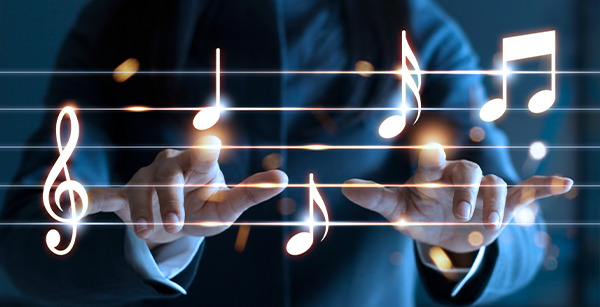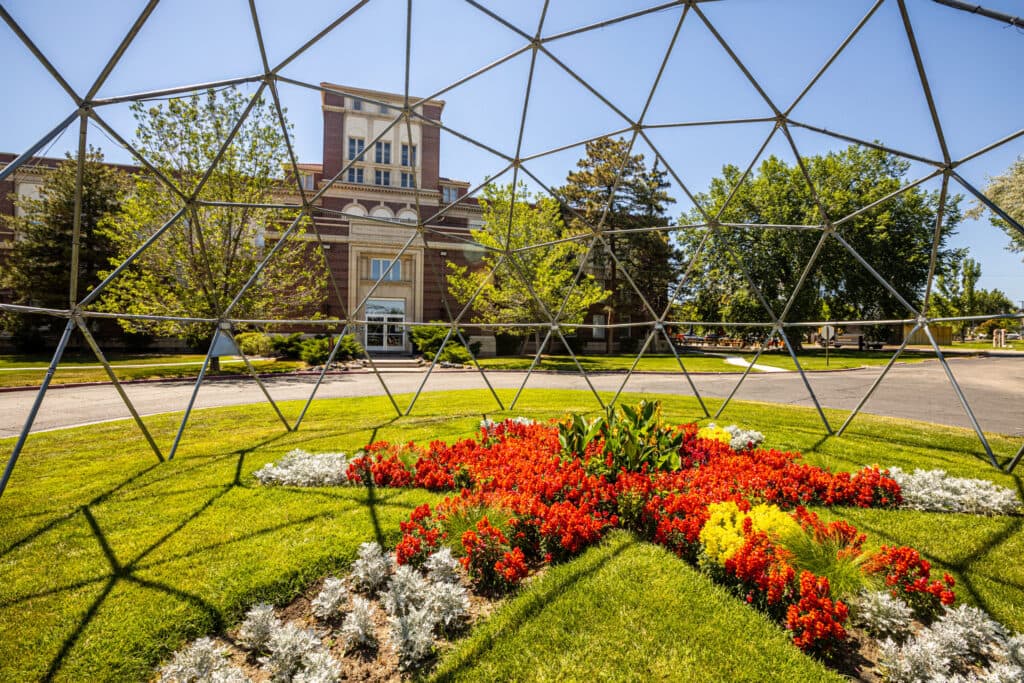Music is fluid – meaning, it can be interpreted in several different ways depending on a number of variables such as how it is being displayed. A common misconception about the power of sound is that it is communicated universally. Rocky Mountain College of Art + Design (RMCAD) Chair of Music Production, Sean Peuquet comes with a wealth of knowledge, combining historical context with emerging technologies. The musician, artist and scholar provides his insight and what students can gain from earning a RMCAD Music Production degree.
What separates music (or music production) different from other mediums of art?
Short answer: time. Musicians grapple with organizing sounds, sure. But music can be composed of any sound materials, and electronic music has long since opened up and explored an ever vaster universe of sonic possibilities. So at this point, while sound (acoustically, perceptually, and conceptually) is and will continue to be essential to music making, I’m tempted to say we fixate on sound, often imbuing it with some mystical properties, as being what differentiates music from other artistic mediums. I’m being a little bit provocative here, but in some way, we do this despite the obvious knowledge that sound is both inescapable and often generic. For instance, what the electronic capture and manipulation of sound has enabled in music, is also available and used in film, video art, installation, radio, podcasting, sculpture etc. What really separates music from other mediums is how sound (boring, flat, generic sound, that is) is organized in time. While we could argue that time is also essential to every art form (from game art to literature to sculpture), simply as a consequence of being here in our (sometimes virtual) world, in my view, music is forced to confront and address time directly. There’s no way around it. Musicians ask much of our audiences. We ask for time, a set duration of it— a scarce commodity, indeed.
Why is music not a universal language?
Songs, sounds, patterns, performances— all the things involved in music making— mean different things to different people. Musical performance and experience only means something consistent, something denotative, within very, very tight social and cultural confines. The idea that music might be a universal language reflects an elevation of a particular culture’s music (historically concert music of the European Classical tradition) over and above the variety of musical expressions reflected across all of the world’s cultures. Anthropologists and ethnomusicologists have never identified a society that does NOT have some form of musical practice— but music as both an idea and functions differently within each cultural mode of musical expression. I’m fond of quoting Jacques Attali’s statement that “outside of a ritual context or a spectacle, the music object has no value in itself. It does not acquire one in the process that creates supply.”* In other words, music’s value (its meaning) is only derived by the people who value it.
Also, from a music cognition and linguistic perspective: Lerdahl and Jackendoff, a composer and linguist research pair who studied music’s relationship to language in the 80s and 90s found that music, universally, lacks syntax, a key component of what makes any language a language. Localized forms of consistent musical understanding are possible, within the confines of a piece or very strict stylistic conventions, but without a generalized syntax, music is precluded from presenting sounds in codified patterns that denote, i.e. explicitly mean, something else.
* Jacques Attali, Noise: The Political Economy of Music, trans. Brian Massumi (Minneapolis: University of Minnesota Press, 2003), 106.
Is it possible for people to communicate through music? If so, how?
Communication is central to our everyday understanding and experience of music, because music seems to communicate something to each of us when we spend the time listening to it, dancing to it, performing it, or even when we try to write it. But I also think music is enigmatic this way, a very shy communicator. When we wonder about what music communicates, we imply a sender and a receiver— from whom, and to whom, does music communicate something? There are many different ways to imagine these lines of communication. For instance, we can imagine communication from composer to performer, from performer to listener, from listener to performer, from performer to performer, from oneself to oneself, and so on. And the various roles a musician can occupy in that list can align with the various technical jobs of songwriter, DJ, producer, vocalist, or recording, mixing, or mastering engineer (performers, of sorts!). Certainly the feelings that we express through music or that music elicits in us can be powerful no matter what role in the production of that music we play. It’s also pragmatic, we triangulate the music to cultivate shared understandings or shared feelings and we use words to describe those effects, to clarify more explicitly what the music is communicating to us as individuals. But it always begs the question of there being some excess, or remainder, of thought or feeling; what is in the music more than the music itself? The answer is always the same: my desires, my attention, my feelings, my sensations, and the interpretations I project upon the music I hear. In this sense, communication might be possible through music, but it always seems to point back toward, or fold in upon, me in my relation to the music, my access to it, more than the music exerting some communicative power itself. Sometimes my interpretations may align (miraculously) with what the songwriter or recording engineer wanted. But let’s not ascribe that communicative power to the music; that power is ours— to put something out into the world as a producer, and then to go to work trying to make meaning out of it as a listener.
Why is it important to make distinctions like this when it comes to studying music?
Music is a slippery subject. It’s both fun and challenging to learn to listen in new and critical ways that open up new possibilities for us to act creatively. Making distinctions, between music and language, or between intention and effect, etc. help us to identify what we care about, why something is meaningful (or not) to us, and how we might open up new experiences for others— to listen differently and construct meaningful musical engagements. But I think it’s always important to be cautious about what’s important too; distinctions without a difference aren’t particularly useful for making art or music. Drawing distinctions should (hopefully) lead to new creative actions.
What are other common misconceptions when it comes to studying Music Production?
Here’s a misconception: it’s all about making Beats. It can be, and it can also be a whole lot more. Just like with any subject, it depends on how far down the rabbit hole you want to go… and I don’t just mean technologically. Sure, music production can be about what knobs, faders, and buttons to push, or how to design a unique sound, build a new acoustic or digital instrument, or mix audio in a multichannel surround environment. But music production also involves cultivating and applying your critical and innovative thinking skills— being creative given a whole studio of resources, endless sample libraries, and near perfect acoustically treated rooms, or being creative with nothing but a fork and a water glass.
Can you tell us what Music Production students can expect during their first year at RMCAD?
Yes! First year students will immediately begin developing the diverse foundational skills that will eventually make them exceptional musicians and producers. Music production is necessarily an interdisciplinary and integrative field. So students will learn critical listening and analysis skills, how digital audio works, basic workflows in multiple digital audio workstations (DAWs), MIDI, songwriting, music theory (in a really fun, relevant, and applied way), and how the music industry works in relation to different career paths and professional practices. Students will also take their first liberal arts courses to become better communicators, globally conscious thinkers, and historically informed and knowledgeable artists and collaborators.
What will students get out of a RMCAD Music Production degree that they won’t get anywhere else?
Music, just like any art, is a cultural enterprise. RMCAD’s program is designed to draw connections between the technical skill sets needed to produce music and the creative and artistic knowledge to know how and when to use the right tool for the job. We value and integrate a strong liberal arts and humanities perspective into our program— to understand why music matters, how people create meaning in relation to musical experience, and why your approach to music production is valued and can serve broader goals both within and across different communities. The RMCAD music production program is also designed with the future and a changing industry in mind. The music industry of 30 years ago is not the music industry of 10 years ago. And the music industry of 10 years ago is not the music industry of today. Our world is changing faster than ever— both technologically and culturally. Our program is designed to equip you with the deep technical knowledge needed to adapt to new software and hardware workflows, work collaboratively with artists and designers across disciplines, and forge new paths, connections, and creative opportunities across your career.
Fundamentally, the RMCAD BFA in Music Production adopts a robust, applied, and future-oriented approach to developing music technology skills, more than a BA degree with a major concentration would provide. And yet, the curriculum and design of our program ensures that you develop a strong critical, cultural, and historical awareness of how and why your work as an artist can help you grow your career, demonstrate leadership in your field, and better the communities around you. This humanities-driven approach to learning music production technologies is unique, will equip you for a life-long career in music, and something you won’t find at other more vocational institutions.
To learn more about the online BFA program at RMCAD, or talk to someone about enrolling in music production, click here.

